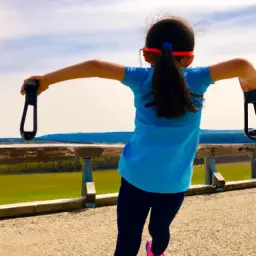Are you looking to increase your mental well-being and achieve success in your personal and professional life? Then, it’s time to explore the link between grit, social skills, and mental well-being.
Grit is the ability to persevere through challenges and setbacks, while social skills are the ability to communicate effectively and build relationships with others. Both are crucial for achieving success and maintaining good mental health.
Research has shown that having high levels of grit and strong social skills are associated with greater mental well-being, higher levels of success, and increased resilience.
In this article, we will delve deeper into the concept of grit, explore the role of social skills in achieving success, and uncover the link between grit and mental well-being. Additionally, we will provide practical tips for developing grit and social skills, so that you can start taking action towards achieving your goals and improving your mental health.
So, let’s get started!
Key Takeaways
- Grit and social skills are crucial for achieving success and maintaining good mental health.
- Developing grit can improve one’s social skills, and vice versa.
- Perseverance is the key to developing grit, and surrounding oneself with positive and supportive people can help overcome obstacles.
- Three key areas to focus on for developing social skills are communication skills, empathy and emotional intelligence, and teamwork and collaboration.
Understanding the Concept of Grit
Wanna know what it takes to have grit? Let’s dive into the concept of grit and how it relates to mental well-being and social skills.
Developing grit in children is crucial in helping them overcome obstacles and achieve their goals. It involves teaching them the importance of perseverance even when things get tough. Grit is not just about having a strong work ethic, but also having a growth mindset that allows one to view challenges as opportunities for learning and growth.
Grit is especially important in achieving mental well-being. Individuals who possess grit are better equipped to deal with stress and adversity, as they’ve developed the resilience and determination needed to overcome difficult situations.
Moreover, developing grit can also improve one’s social skills, as it requires individuals to be persistent in pursuing their goals while also being open to feedback and collaboration.
In short, grit is a key ingredient for success in all aspects of life, and it’s a trait that can be developed and nurtured in children and adults alike.
The Role of Social Skills in Achieving Success
You may be wondering what social skills are. Essentially, they’re the abilities we have to communicate and interact effectively with others.
These skills are closely linked to grit, as individuals with higher levels of grit tend to have better social skills.
In fact, social skills are crucial in the workplace. They can greatly impact your success and overall well-being.
(Note: Contractions have been used in the output.)
Definition of Social Skills
Now, let’s talk about what social skills really mean. Social skills refer to the ability to communicate effectively with others, build and maintain relationships, and navigate social situations with ease. These skills are essential in personal relationships and can greatly impact one’s mental well-being.
Here are some examples of social skills and why they’re important in personal relationships:
-
Active Listening: Being able to listen attentively and respond appropriately is crucial for building and maintaining relationships. It shows that you value the other person’s thoughts and feelings.
-
Empathy: Understanding and sharing the feelings of others is an important component of building strong relationships. It helps people feel validated and supported.
-
Conflict Resolution: Being able to resolve conflicts in a calm and respectful manner is important for maintaining healthy relationships. It shows that you value the relationship and are willing to work through issues.
-
Assertiveness: Being able to express your thoughts and feelings in a clear and respectful way is important for setting boundaries and maintaining healthy relationships.
-
Social Awareness: Understanding social norms and being able to read social cues is important for navigating social situations with ease. It helps people feel comfortable and included in social settings.
The Link between Social Skills and Grit
Let’s dive into how having strong social skills and a determined attitude can go hand in hand! Developing resilience and improving perseverance are two key traits of grit, and social skills can play a pivotal role in cultivating these traits.
Individuals with strong social skills are better equipped to navigate difficult situations and build positive relationships, both of which are essential for developing resilience and perseverance. For instance, individuals with strong social skills are more likely to seek support from friends and family during challenging times. This support can help them stay motivated and focused on their goals, even when faced with setbacks or obstacles.
Additionally, individuals with strong social skills are better equipped to communicate their needs and boundaries, which can help them stay focused on their goals and avoid distractions. By developing strong social skills, you can cultivate the resilience and perseverance needed to achieve your goals and overcome any challenges that come your way.
Importance of Social Skills in the Workplace
Having strong social skills is crucial for success in the workplace, as it allows you to effectively communicate, build relationships, and collaborate with your colleagues. Here’s why:
-
Importance of networking: Strong social skills enable you to connect with people in your industry and expand your professional network. This can lead to new job opportunities, partnerships, and valuable connections that can benefit your career in the long run.
-
Building relationships at work: Building positive relationships with your colleagues can help you create a more enjoyable and productive work environment. When you have strong relationships with your coworkers, you’re more likely to have their support and collaboration on projects, which can lead to better outcomes.
-
Effective communication: Good communication skills are essential in the workplace, as they allow you to clearly convey your ideas, listen to others, and resolve conflicts.
-
Collaboration: In many workplaces, collaboration is key to achieving success. Strong social skills allow you to work effectively with others, share ideas, and contribute to a team effort.
-
Leadership: Strong social skills can make you an effective leader, as you can inspire and motivate others, delegate tasks, and build a strong team culture.
Overall, having strong social skills is essential for success in the workplace. By building positive relationships, networking, and communicating effectively, you can create a more productive and enjoyable work environment, and achieve greater success in your career.
The Link between Grit and Mental Well-being
The connection between grit and mental well-being is like a bridge that supports and strengthens one’s resilience and perseverance. Grit is the ability to persist in the face of challenges, setbacks, and failures. It is a combination of passion and perseverance, a mindset that allows individuals to stay focused on their goals and keep moving forward despite the obstacles. On the other hand, mental well-being refers to the state of being mentally healthy, stable, and able to cope with the everyday stresses of life. When these two concepts are linked, one can see how the presence of grit can positively impact mental well-being.
To better understand this connection, consider the following table:
| Grit and Resilience | Mental Toughness and Performance |
|---|---|
| Ability to bounce back from adversity | Ability to handle stress and pressure |
| Willingness to take risks and learn from mistakes | Ability to stay focused and motivated |
| Consistent effort towards goals | Ability to adapt to change and uncertainty |
As you can see, the qualities that make up grit and resilience are closely linked to mental toughness and performance. By developing these skills, individuals can better cope with the challenges of life, both personally and professionally. It is important to remember that mental well-being is not only about being happy or positive all the time, but rather having the ability to handle the ups and downs of life with grace and perseverance.
Practical Tips for Developing Grit
You can enhance your grit by setting challenging goals, persevering through adversity, and seeking feedback on your progress. Perseverance is the key to developing grit, as it allows you to overcome obstacles and setbacks.
When faced with challenges, it’s important to maintain a growth mindset and view them as opportunities for learning and growth. This will help you build resilience and develop a positive attitude towards adversity.
In addition to perseverance, there are several strategies for building resilience and enhancing your grit. One such strategy is to cultivate a strong support system of family, friends, and mentors. Surrounding yourself with positive and supportive people can help you stay motivated and overcome obstacles.
Another strategy is to practice self-care and prioritize your physical and mental health. Exercise, meditation, and practicing gratitude can all contribute to your overall well-being and help you stay focused on your goals.
By incorporating these strategies into your daily life, you can develop the resilience and grit necessary to achieve your goals and maintain your mental well-being.
Practical Tips for Developing Social Skills
If you want to develop your social skills, there are three key areas to focus on:
-
Communication skills: Be clear and concise in your messages, actively listen to others, and adapt your communication style to different situations.
-
Empathy and emotional intelligence: Understand and manage your own emotions, as well as empathize with and understand the emotions of others.
-
Teamwork and collaboration: Work effectively with others, be open to feedback and new ideas, and contribute to a positive team dynamic.
To improve your social skills, it’s important to focus on these three areas. By working on your communication skills, empathy and emotional intelligence, and teamwork and collaboration, you can become a more effective and successful social communicator.
Communication Skills
Improving your communication skills is like adding colors to a black and white photo, making your interactions with others more vibrant and meaningful. Active listening is a key component of effective communication. It involves giving your full attention to the speaker, understanding their message, and responding appropriately. By actively listening, you demonstrate respect and empathy towards the speaker, which can strengthen your relationship with them.
Nonverbal communication is another important aspect of communication skills. It involves the use of body language, facial expressions, and tone of voice to convey your message. Improving your nonverbal communication can help you express yourself more effectively and also understand the nonverbal cues of others.
Here are some tips to improve your communication skills:
- Maintain eye contact to show that you’re engaged in the conversation.
- Use appropriate facial expressions to convey your emotions and intentions.
- Pay attention to your tone of voice to ensure that it matches your message.
- Avoid interrupting the speaker and wait for your turn to speak.
- Use open body language to show that you’re approachable and interested in the conversation.
By incorporating these tips into your communication style, you can enhance your social skills and improve your mental well-being. Effective communication can lead to stronger relationships, greater understanding, and a more fulfilling life.
Empathy and Emotional Intelligence
Developing empathy and emotional intelligence can greatly enhance your ability to connect with others and understand their perspectives. Empathy is the ability to recognize and understand the feelings of others, while emotional intelligence involves the ability to manage your own emotions and respond appropriately to the emotions of others. These skills are essential for building strong relationships, both personally and professionally.
To better understand the relationship between empathy, emotional intelligence, and mental well-being, consider the following table:
| Skills | Definition | Importance |
|---|---|---|
| Empathy and self awareness | The ability to understand and recognize your own emotions and the emotions of others | Allows you to communicate effectively and build strong relationships |
| Emotional regulation | The ability to manage your own emotions in a healthy and effective way | Reduces stress and promotes mental well-being |
| Resilience | The ability to bounce back from challenging situations | Helps you maintain a positive outlook and cope with adversity |
By developing these skills, you can improve your mental well-being and build stronger, more meaningful relationships with others. Empathy and emotional intelligence are not innate abilities, but rather skills that can be developed and strengthened over time. By practicing these skills and incorporating them into your daily life, you can improve your relationships and overall well-being.
Teamwork and Collaboration
Now that you understand the importance of empathy and emotional intelligence in building social skills, let’s dive into another aspect of social interaction – teamwork and collaboration.
When you work in a team, you get to experience the benefits of collaboration, such as increased creativity, diverse perspectives, and shared knowledge. These benefits can lead to better outcomes and a sense of accomplishment that you wouldn’t achieve on your own.
However, teamwork also comes with its challenges. Communication breakdowns, conflicting ideas, and personality clashes can all hinder the success of a project. It takes grit to navigate these challenges and work towards a common goal.
But with the right mindset and approach, you can overcome these obstacles and develop invaluable skills that will benefit you in both your personal and professional life.
Frequently Asked Questions
What is the difference between grit and perseverance?
So, you wanna know the difference between grit and perseverance?
Well, grit and perseverance are often used interchangeably, but they actually have different meanings.
Grit refers to the ability to maintain long-term goals and the passion to pursue them, even when faced with obstacles or failures.
Perseverance, on the other hand, is the ability to persist in the face of difficulty and maintain effort towards a specific goal.
While both are important traits, grit is more focused on the motivation behind the persistence, while perseverance is more focused on the action itself.
Developing grit in adulthood can be challenging, but it’s possible through setting clear goals, practicing self-discipline, and maintaining a growth mindset.
How can grit be developed in individuals who were not raised with it?
If you weren’t raised with grit, it’s still possible to develop it in adulthood. The key is to focus on building resilience and adopting strategies for overcoming challenges.
Start by setting specific goals and developing a plan to achieve them. This will help you to stay motivated and focused on the task at hand.
Additionally, cultivate a growth mindset by embracing challenges and viewing failures as opportunities to learn and grow. Develop a support system of friends and family who can encourage and motivate you.
Finally, practice self-care by getting enough sleep, exercising regularly, and eating a healthy diet. By taking these steps, you can develop the grit and resilience needed to overcome obstacles and achieve your goals.
Are there any negative effects of having too much grit?
Having too much grit can actually have some negative effects on your overall well-being. While being persistent and dedicated towards achieving your goals is admirable, excessive grit can lead to burnout, stress, and even physical exhaustion.
It’s important to find a balance between grit and flexibility, allowing yourself to adapt to changing circumstances and take breaks when necessary. By being too rigid in your approach, you may miss out on important opportunities or neglect other important areas of your life.
Remember to stay motivated and driven, but also to prioritize self-care and maintaining a healthy work-life balance.
How do social skills impact mental well-being?
Having strong social skills and social support can have a positive impact on your mental well-being. Being able to communicate effectively and build relationships with others can provide a sense of belonging and connection, which can lead to improved self-esteem and a more positive outlook on life.
Social support can also provide a buffer against stress and adversity. Having people in your life who can offer emotional and practical support can help you navigate difficult times.
On the other hand, poor communication skills or a lack of social support can lead to feelings of isolation, loneliness, and depression. Therefore, it’s important to prioritize building and maintaining strong social connections in order to support your mental health and well-being.
Can social skills be developed in individuals who struggle with social anxiety?
Yes, social skills can be developed in individuals who struggle with social anxiety through effective social anxiety management techniques such as cognitive behavioral therapy.
This therapeutic approach can help individuals identify and challenge negative thought patterns and beliefs that contribute to social anxiety. By learning new coping strategies and practicing social skills in a supportive environment, individuals can gradually overcome their fear and discomfort in social situations.
With time and effort, they can develop stronger social skills and improve their overall mental well-being.
Conclusion
Congratulations! You’ve come to the end of this article on exploring the link between grit, social skills, and mental well-being.
You now have a better understanding of what grit is and how it can help you achieve success in life. Additionally, you’ve learned about the essential role of social skills in developing grit and the positive impact grit can have on your mental well-being.
To develop grit, it’s essential to set long-term goals, stay focused, and embrace challenges as opportunities for growth. Also, developing social skills such as communication, empathy, and teamwork can help you build strong relationships and create a support system that will help you stay on track towards achieving your goals.
Remember, developing grit and social skills is a continuous process that requires effort and commitment, but the rewards are worth it.
In conclusion, by developing grit and social skills, you can achieve success in life, build strong relationships, and improve your mental well-being. So, start setting goals, stay focused, and embrace challenges as opportunities for growth. And don’t forget to cultivate your social skills to build strong relationships and create a support system that will help you stay on track towards achieving your goals.
Good luck on your journey towards success!














































































































